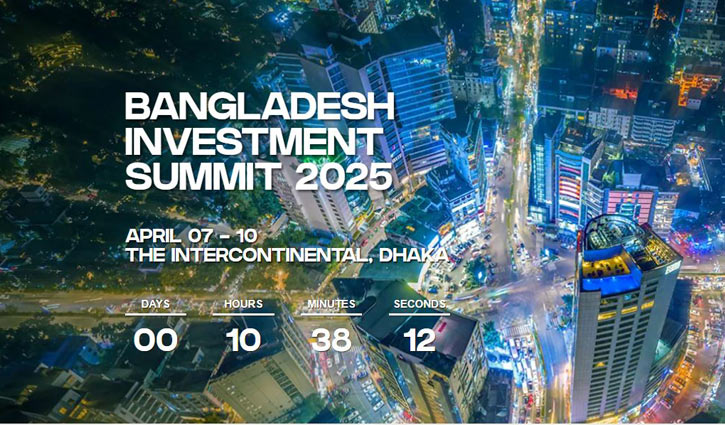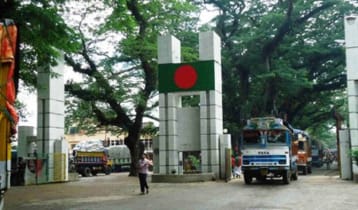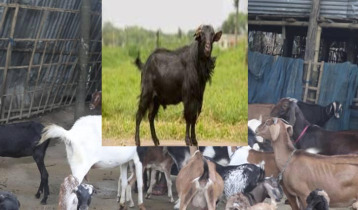Bangladesh Investment Summit-2025 to help woo FDI
Imtiaz Ahmed || risingbd.com

The Bangladesh Investment Summit-2025, organized by the Bangladesh Investment Development Authority (BIDA) recently, primarily gives a positive branding about Bangladesh as an investment destination to entrepreneurs and investors in overseas countries.
Nuria Lopez, Chairperson of the European Union Chamber of Commerce in Bangladesh (EuroCham), said this.
EuroCham officially launched on 3 December 2024 at the Hotel Radisson in Dhaka is a business initiative that is actively supported by the European Union Delegation and the EU Member States in Bangladesh.
The Chamber will serve as a centre of excellence, promoting business relations between European investors and their counterparts in the country.
Nuria Lopez, a Spanish citizen and Managing Director of Zalo Knitting Ltd, a leading entrepreneur in the export-oriented readymade garment industry, has been living in Bangladesh since the early 90s.
The presentation of the Bangladesh Investment Summit-2025 is different this year compared to the summits held in the previous years, said Nuria Lopez.
However, law and order situation, transparent bureaucracy, timely execution of orders at the grassroots levels, uninterrupted power generation, continuation of investment policy and repatriation of profits are also to be ensured, said Nuria Lopez.
BIDA Executive Chairman Chowdhury Ashik Mahmud Bin Harun presented the business and investment potential of Bangladesh.
Chowdhury Ashik Mahmud is working to turn the BIDA into energetic and robust organization with a vision to woo foreign direct investment (FDI), said Nuria Lopez.
The Spanish entrepreneur also said that Pran-RFL Group, in collaboration with H&M Group and International Finance Corporation (IFC), has announced plans to generate solar power, to be used in the apparel sector, marking a significant step towards promoting sustainability within the country's vital RMG industry.
The clean electricity will be purchased by Bangladeshi garment suppliers serving the globally renowned Swedish brand Hennes & Mauritz AB (H&M),
The MoU sets the stage for piloting Bangladesh's first Corporate Power Purchase Agreement (CPPA). Supported by the IFC and led by Pran-RFL Group, this project will link several of H&M's selected suppliers to a newly-developed solar park.
Oscar Garca Maceiras, CEO of Inditex, had signed a deal with Pran Group to set up a power plant that will help ease power crisis in the country.
Bangladesh’s economy will be in deep crisis unless a congenial environment and uninterrupted production are ensured in the export–oriented garment industry, the largest earner of export earnings of the country, said Nuria Lopez, also former president of Spain Bangladesh Chamber of Commerce and Industry.
Corruption, nepotism, mismanagement and plundering of the state wealth plagued the economy of Bangladesh during the last several years that will stage back under the prudent leadership of Bangladesh's interim government Nobel Peace Laureate Professor Dr. Muhammad Yunus, said Nuria Lopez.
Nuria Lopez, a Spanish national who came to Bangladesh in the early 90s and set up the export –oriented garment industry in Gazipur, said the readymade garment industry (RMG) is the backbone of the economy generating some 4.00 million jobs directly and indirectly some 15 million jobs in the country.
Bangladesh received its lowest net foreign direct investment (FDI) inflow in the past five years in 2024, as the country experienced political turmoil and economic instability.
A sluggish inflow in the first half of the year, compounded by mass uprising, the subsequent departure of the Awami League government in August, and a volatile forex situation throughout the year, contributed by experts to a 13.25% year-on-year decrease in net FDI in 2024.
According to central bank data, net FDI inflow amounted to $1.27 billion in 2024, significantly down from $1.46 billion a year ago.
When asked why FDI declined in 2024, Mohammad Ali, managing director and chief executive officer of Pubali Bank, said that foreign investors lacked confidence in the year against the backdrop of sliding in the law and order situation of the country after the political changeover.
He said, “We did not receive much foreign investment during the first six months of 2024. Then in July, following student-led mass protests, the government was overthrown in August and a new interim government took office”.
“During that period, the country's law and order situation deteriorated, although conditions began to improve after December. Foreign investors generally lack confidence in such situations, which is the main reason why FDI in 2024 was lower compared to previous years.”
Meanwhile, the interim government has a major task to ensure sound law and order situation as the past Awami League government transformed the country’s law enforcement agencies into ‘monsters’ over the last 15 years.
The Bangladesh economy will suffer heavily provided the export-oriented garment industry, the largest earner of export earnings of the country, are being targeted by miscreants, said Nuria Lopez.
Meanwhile, the Spanish entrepreneur has expressed his support to Bangladesh's interim government led by Nobel Peace Laureate Professor Dr. Muhammad Yunus.
The interim government should ensure sound law and order situation and protect business establishments and businessmen to revive the economy, said leaders of the Japan Chamber of Commerce and Industry (JBCCI), International Chamber of Commerce, Bangladesh (ICCB), Bangladesh Garments Manufacturers and Exporters Association (BGMEA), Federation of Bangladesh Chambers of Commerce and Industry (FBCCI) while talking to this correspondent.
However, as the country is going through a transition period, smooth engagement and participation of the existing import and export houses in the country is also important to retain the economy on the right track.
The economy of Bangladesh has suffered a massive blow during the student movement on quota system in the government job during the period of July, 2024.
Managing Director of Zalo Knitting Ltd, Nuria Lopez said that the employment generation in the economy is important as some 20 lakh youths are entering the job market every year. The RMG is the labour intensive industry and the highly densely populated country like Bangladesh can’t sustain generating thousands of jobs.
Urging the stakeholders concerned to extend cooperation to the Nobel laureate to carry out necessary reforms, the economy will require several years to overcome the loss centering movement and violence and laid emphasis on normalcy to run business.
High economic disparity, corruption, nepotism, slow employment creation, Russia-Ukraine war, siphoning off state wealth out of the country by some corrupt persons have created a crisis in the economy, she said.
Meanwhile, the International Monetary Fund (IMF) has praised Bangladesh's measures, taken by the interim government, to overcome economic challenges due to the recent turbulence and major floods.
“In response to the challenging circumstances, the authorities' efforts to initiate adjustments, including continued monetary tightening and rationalizing non-priority capital spending are commendable," IMF Mission Chief for Bangladesh Chris Papageorgiou said.
BIDA Executive Chairman Chowdhury Ashik Mahmud Bin Harun presented the business and investment potential of Bangladesh.
Meanwhile, Chief Adviser Professor Muhammad Yunus recently urged the global investors to come up with their business in Bangladesh to change the world saying Bangladesh is the best place for investment.
“Bangladesh is a country with crazy ideas to change the world...so we invite you to join that craft not only to change Bangladesh by your business but to change the world,” he said while addressing the inaugural session of Bangladesh Investment Summit-2025 at Hotel Intercontinental here.
Prof Yunus said: “If you want to make a business with a purpose, along with the business we do, Bangladesh is the place."
Meanwhile, the recently concluded Bangladesh Investment Summit 2025 has yielded investment declaration worth Tk 3,100 crore, says Chowdhury Ashik Mahmud Bin Harun, executive chairman of the Bangladesh Investment Development Authority (BIDA).
He shared the information at a press conference at the Foreign Service Academy in the capital.
The European Union Chamber of Commerce in Bangladesh (EuroCham) has laid emphasis on a collaborative and transparent approach to energy pricing reforms, voicing concerns over the recently proposed gas tariff structure by the Bangladesh Energy Regulatory Commission (BERC).
In a statement, EuroCham acknowledged the government's strides toward a sustainable energy future but warned that the differential tariff mechanism — based on industrial consumers' contractual timelines and gas connection status — could inadvertently hurt investor sentiment and industrial growth.
According to the chamber, the newly-proposed model risks placing an unfair burden on new and expanding industries, which would face significantly higher gas tariffs than their long-established counterparts — despite operating within the same sector.
“Fragmented energy costs across similar operations may erode Bangladesh's competitive edge and discourage both foreign and domestic investment,” said EuroCham, pointing out that the proposed structure comes at a time when Bangladesh is actively courting global investors.
EuroCham echoed the concerns voiced by industry stakeholders during BERC's public hearing in February and backed calls for a more inclusive, consultative reform process.
The chamber encouraged BERC to engage more deeply with both foreign and domestic stakeholders when crafting energy policies that impact long-term business planning.
“Energy pricing must align with Bangladesh's broader goals of industrial resilience, energy security, and sustainable development," the chamber noted.
Reaffirming its commitment to Bangladesh's development journey, EuroCham pledged to work closely with the government to shape policies that foster inclusive growth and a globally competitive investment climate.
With energy reforms at a critical juncture, the chamber's message underscores the need for policy alignment that not only addresses sustainability but also nurtures the confidence of investors driving the country's industrial future.
The cost of doing business is high that sometimes erode the competiveness of the local industries, said business leaders in Bangladesh demanding an improvement in ease of doing business to establish a conducive trade and investment ecosystem.
The major challenges for the national budget for the fiscal year 2024-25 will be controlling inflation, increasing the foreign exchange reserves, exports, and the tax-GDP ratio, and bringing reforms in the banking sector.
Global FDI amounted to $1.3 trillion in 2022, with nearly half being made in Asia. South Asia saw an overall 7 percent increase, but Bangladesh witnessed a decline.
"Additionally, the customs, tax and VAT systems have to be automated and if the National Logistics Development Policy is implemented, it will help cut the cost of doing business," said Mahbubul Alam, president of the Federation of Bangladesh Chambers of Commerce and Industry.
Emphasis should also be placed so that the interest rate of bank loans does not go up. This is because if the interest rate climbs, industrialisation and investment in the country will be hampered.
According to the latest United Nations Trade and Development report, global FDI amounted to $1.3 trillion in 2022, with nearly half being made in Asia. South Asia saw an overall 7 percent increase, but Bangladesh saw a decline.
FDI in Bangladesh amounted to just 0.4 percent of the country's GDP in 2022 while the ratio was 1.5 percent in India and 4.4 percent in Vietnam.
In 2023, FDI to Bangladesh snapped its rising trend. Central bank data showed last week that the country received $3 billion in FDI last year, a decrease of 14 percent from $3.5 billion in 2022.
An analysis of the central bank data shows that Bangladesh received $1.57 billion in net FDI in 2021. Since then, net FDI has declined each year compared to the previous one. Overall, based on revised data following the BPM6 manual, the net FDI received in 2024 is the lowest since 2020. Data prior to 2000 was recorded according to the BPM5 manual, and therefore cannot be compared with the more recent figures.
The central bank data analysis shows that of the net FDI received in 2024, $622 million came from reinvested earnings. In other words, 49% of the total net FDI for the year was reinvested earnings. In addition, $545 million entered the country as equity capital. Furthermore, $104 million came as intra-company loans.
When asked why reinvested earnings make up a major portion of FDI, a senior official of the central bank explained, “The return on investment in our country is quite good. As a result, many investors choose to reinvest the income they earn from their existing investments. However, in many cases, investors face various obstacles, including a shortage of US dollars, when trying to repatriate their earnings. Consequently, they are often compelled to reinvest their earnings.”
According to the central bank data, in 2024, the highest investment — $416 million — was made in the banking sector. Additionally, the textile and wearing sector received $407 million in investment. Sectors such as pharmaceuticals and chemicals, power, gas and petroleum, and food also attracted significant investment.
Echoing Mohammad Ali, a deputy managing director of a private bank said, “When a new government comes to power, there is often a possibility of changes in various policies, including tax rates. The current government is a short-term one, so investors are waiting to see what kind of policy changes might occur once a more stable government is in place. This is one of the key reasons behind the decline in foreign investment.”
In the second week of April, the Bangladesh Investment Development Authority (Bida) and the Bangladesh Economic Zones Authority (Beza) jointly organised the Bangladesh Investment Summit 2025.
Chowdhury Ashik Mahmud Bin Harunsaid that the investment summit successfully created immense potential for attracting both foreign and local direct investment. He pointed out that the summit drew 415 foreign delegates from 50 countries.
The writer is a senior journalist
Dhaka/ Mukul























